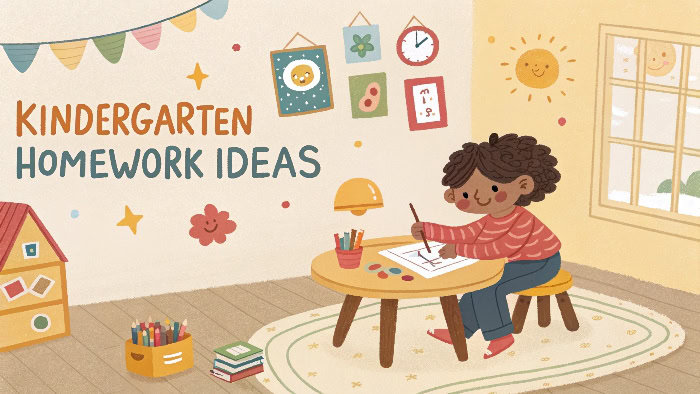
Introduction:
“Is helping your child with homework a struggle? Learn how to turn daily homework time into a positive, productive routine with this simple, supportive guide.”
Body:
Read the following article to learn about child with homework in textual format.
1. Homework Help for Kids
Finding the right Homework Help for Kids can significantly ease evening stress and boost a child’s confidence. Effective kids homework assistance doesn’t mean doing the work for them, but rather guiding them toward understanding. Therefore, providing these resources fosters independence.
Moreover, children’s homework support can come in many forms, from a parent’s patient encouragement to dedicated online platforms. Many homework help websites offer interactive tools and explanations tailored for young learners, targeting specific skills. Additionally, these sites can make difficult concepts more accessible, leading to improvement.
Some resources even provide elementary homework help specifically, or free homework help online, making support accessible to all. These tools can be invaluable for building foundational knowledge and a positive attitude towards learning. Ultimately, the goal is completion and genuine mastery of the subject matter.
2. Homework Stress in Children

Recognizing Homework Stress in Children is the first step towards creating a healthier learning environment and mitigating anxiety. If you notice your child stressed about homework, it’s crucial to address the root causes with empathy. Indeed, a “Child With Homework” under pressure may struggle to absorb information effectively.
Furthermore, observing signs of homework anxiety, such as avoidance or emotional outbursts, warrants a gentle approach to reduce schoolwork stress. Simple strategies for coping with homework pressure can make a significant difference in their overall well-being and focus. This proactive stance can prevent long-term frustration.
Consequently, learning how to help child manage stress related to academics is a vital parenting skill. Creating an open dialogue and a supportive atmosphere can transform their experience, aiming for reduced_stress and a sense of calm. This contributes to their emotional development.
3. Creating a Homework Routine
Creating a Homework Routine is fundamental for instilling discipline and predictability, which can greatly benefit a child with homework. A consistent daily homework schedule helps children understand expectations and manage their time effectively. This routine becomes a cornerstone for academic success.
Similarly, an after school routine kids can look forward to, incorporating homework, play, and rest, promotes balance and reduces resistance. Establishing a consistent homework time signals that this activity is a priority, fostering good habits. This brings a sense of order to their day.
Lastly, using tools like a homework routine chart can visually reinforce the schedule, while actively establishing homework habits from a young age builds a foundation for future responsibility. The aim is to make homework a natural part of their day, leading to consistent completion. This structured approach provides security.
4. Making Homework Fun

Transforming assignments by Making Homework Fun can dramatically change a child’s attitude towards learning and reduce homework battles. Exploring fun homework ideas tailored to their interests can spark engagement and curiosity. For instance, a “Child With Homework” might enjoy turning math problems into a game.
Additionally, incorporating creative homework activities or engaging homework tasks can make the process feel less like a chore and more like an exploration. Think about using homework games for kids that reinforce concepts in an interactive way, promoting positive_attitude. This fosters a sense of joy in learning.
Ultimately, the goal of making learning enjoyable is to cultivate a lifelong love for knowledge and discovery. When homework feels less like pressure and more like an opportunity for achievement, children are more likely to invest their effort willingly. This positive association is key to their academic growth.
5. Ideal Homework Environment
An Ideal Homework Environment significantly impacts a child’s ability to focus and complete tasks effectively, leading to better understanding. A quiet study space kids can call their own minimizes distractions and signals it’s time for concentration. This dedicated area fosters a sense of calm.
Moreover, a proper homework desk setup, with good lighting and comfortable seating, can make a big difference in their physical comfort and mental preparedness. Ensuring a distraction-free study area means removing phones, television, and other potential interruptions. This promotes deep focus.
Finally, a comfortable homework spot combined with readily accessible and organizing study materials like pencils and paper reduces frustration and wasted time. The objective is to create a space conducive to learning and efficient completion. This thoughtful setup shows support.
6. Child Refuses Homework

When a Child Refuses Homework, it can be a significant source of parental frustration, but it’s often a symptom of an underlying issue. If you find yourself saying, “my child won’t do homework,” it’s important to investigate why with patience rather than immediate discipline. Sometimes, the root cause for a “Child With Homework” struggling is a lack of understanding of the material.
Furthermore, dealing with homework refusal effectively involves open communication and trying to understand their perspective. You might need to motivate child to do homework by connecting it to their interests or breaking tasks into smaller, manageable steps. This approach offers encouragement.
Identifying effective homework battles solutions often means finding a balance between support and fostering independence. If a child avoids homework consistently, seeking collaborative solutions with their teacher can provide valuable insights and strategies for improvement. The goal is to turn resistance into engagement.
7. Homework Organization Tips
Implementing Homework Organization Tips can empower children with essential life skills and reduce the daily chaos surrounding assignments. A kids homework planner is a fantastic tool for teaching them to manage deadlines and track their progress. This instills a sense of responsibility.
Subsequently, teaching them methods for organizing school assignments, such as using a homework folder system with clearly labeled sections, can prevent lost papers and missed work. Tracking homework due dates becomes a manageable task, reducing last-minute stress. This promotes preparedness.
Also, developing general student organization skills extends beyond homework, benefiting them in all areas of their academic life. The aim is to foster independence and confidence in managing their workload. Good organization is a key to academic success.
8. Kindergarten Homework Ideas

Even at a young age, Kindergarten Homework Ideas can introduce foundational concepts in an engaging way, setting a positive tone for future learning. Simple pre k homework activities often focus on developing fine motor skills, letter recognition, and basic counting. For a young “Child With Homework,” these tasks should feel like play.
Moreover, kindergarten learning sheets can be a fun way to practice writing or identify shapes, especially when presented with colorful illustrations. Providing simple homework for 5 year olds ensures tasks are age-appropriate and don’t cause undue stress. This early exposure builds confidence.
Ultimately, early learning homework should emphasize exploration and discovery, perhaps through play-based homework tasks that encourage creativity and problem-solving. The goal is to foster a love for learning and a sense of accomplishment from the very beginning. This builds positive habits.
9. Elementary School Homework
Elementary School Homework plays a crucial role in reinforcing classroom learning and developing essential study habits. Offering 1st grade homework help might involve reading together or practicing basic math facts in a supportive manner. This early support builds a strong foundation.
As children progress, 3rd grade assignments may become more complex, requiring greater focus and independence. Providing resources for elementary math homework or encouraging practice with reading homework elementary helps solidify these core skills. This consistent effort leads to improvement.
Creative elementary project ideas can also make homework more engaging, allowing children to explore topics in depth and showcase their understanding. The overall aim is to foster responsibility and ensure they are prepared for future academic challenges, leading to success. This builds pride in their work.
10. Middle School Homework Challenges

Middle School Homework Challenges often intensify as the academic workload and complexity increase, sometimes leading to teen homework stress. The typical 6th grade homework load can feel overwhelming if students haven’t developed strong middle school study skills. Understanding these pressures is key when dealing with a “Child With Homework” at this stage.
Furthermore, managing middle school assignments requires better time management and organization than in elementary school. Students may encounter difficult homework middle school topics that demand more critical thinking and problem-solving abilities, sometimes causing anxiety. Providing encouragement is crucial.
Therefore, helping them navigate these challenges by teaching effective study techniques and breaking down tasks can lead to greater confidence and accomplishment. The goal is to equip them with the skills to manage their responsibilities independently, fostering growth. This period is critical for development.
11. Parental Role in Homework
Understanding the Parental Role in Homework is key to fostering a child’s independence while providing necessary support. Many parents wonder how much to help with homework, aiming to guide without taking over. The right balance encourages responsibility.
Moreover, parents supporting homework effectively involves creating a conducive environment and showing interest in their child’s learning journey. Active homework involvement parents demonstrate that education is valued, which can be a powerful motivator. This shows love and connection.
Ultimately, guiding child’s homework means helping them understand concepts and develop problem-solving skills, rather than providing answers. Open parent homework communication with teachers ensures everyone is aligned in supporting the child’s development and academic success. This collaborative approach ensures clarity.
12. Homework and ADHD Child
Navigating Homework and ADHD Child dynamics requires specific strategies and a great deal of patience to help them achieve completion and understanding. Implementing effective adhd homework strategies, such as breaking tasks into smaller chunks and incorporating movement breaks, can make a significant difference. For a “Child With Homework” who has ADHD, traditional methods may not be effective.
Additionally, teaching focus techniques for adhd kids, like using timers or minimizing distractions, is crucial for sustained effort. Specialized homework help for adhd might involve visual aids or kinesthetic learning approaches to cater to their unique needs. This tailored support can reduce frustration.
When an adhd child struggles homework, it’s important to approach the situation with empathy and collaborate with educators on managing adhd and schoolwork. The goal is to build their confidence and equip them with tools for academic success, fostering independence despite the challenges. This leads to noticeable improvement.
13. Benefits of Homework for Kids

Understanding the Benefits of Homework for Kids can help both parents and children appreciate its value beyond just grades. When wondering why is homework important, consider that it reinforces classroom learning and helps solidify knowledge. This repeated exposure is key to mastery.
Furthermore, the advantages of doing homework include the development of time management, organization, and problem-solving skills. Regularly, homework develops skills like responsibility and discipline, which are crucial for lifelong success. These are valuable life lessons.
The purpose of homework elementary school and beyond is multifaceted; it’s not just about the content but also about fostering independence and good study habits. The long-term learning benefits of homework contribute significantly to a child’s overall academic development and preparedness for future challenges, building confidence.
14. Homework Time Management for Children
Teaching Homework Time Management for Children is a critical life skill that can significantly reduce stress and improve academic performance. Developing kids time management skills involves showing them how to plan and prioritize their tasks effectively. This is a vital aspect of supporting a “Child With Homework“.
Subsequently, using tools like a homework timer for kids can help them stay focused and understand how long tasks actually take, promoting efficient work habits. The strategy of breaking down assignments into smaller, more manageable steps can prevent overwhelm and foster a sense of achievement. This builds confidence.
Moreover, prioritizing homework tasks based on deadlines or difficulty is an important aspect of teaching child to manage time. The overall goal is to empower them with the ability to control their schedule and approach their workload with calm, leading to consistent completion and reduced_stress. This fosters independence.
15. Homework Without Tears

Achieving Homework Without Tears is a common aspiration for parents seeking a more peaceful homework time and a positive attitude in their children. Adopting a positive homework approach means focusing on effort and learning rather than solely on perfection or grades. This shifts the dynamic from stress to support.
Additionally, finding ways to reduce homework frustration often involves ensuring the child understands the task and has the necessary resources. Creating a peaceful homework time free from distractions and pressure can make a world of difference. This requires patience from parents.
Ultimately, ending homework struggles and establishing a calm homework environment contributes to a child’s overall well-being and willingness to engage with their studies. The goal is to foster independence and a love for learning, making homework a manageable, even enjoyable, part of their routine. This brings relief to the entire family.
16. Creating a Homework Station
Creating a Homework Station can transform a cluttered corner into an inviting and efficient space for a child with homework, promoting focus and organization. A simple diy homework caddy can keep all essential supplies neatly organized and within easy reach. This small step can significantly reduce frustration. A dedicated “Child With Homework” area shows you value their efforts.
Furthermore, exploring kids study corner ideas can help you design a space that is both functional and appealing to your child, encouraging them to use it. Good homework supply organization means pens, pencils, paper, and other necessary tools are always available, preventing interruptions. This level of preparedness minimizes delays.
A portable homework station can be a great solution for families with limited space, ensuring a consistent work environment wherever they set up. The best homework station setup is one that is quiet, comfortable, and free from distractions, tailored to your child’s needs. The aim is to create an environment conducive to learning and efficient completion. This provides a sense of calm.
17. Homework and Learning Disabilities

Navigating Homework and Learning Disabilities requires tailored strategies, patience, and understanding to ensure children receive the support they need. For instance, providing specialized dyslexia homework help might involve assistive technology or multisensory learning techniques. This targeted approach addresses specific challenges.
Moreover, implementing homework modifications for sped (special education) students, as outlined in their IEP, is crucial for their success. Supporting students with ld (learning disabilities) often means breaking down tasks, allowing extra time, and focusing on effort over perfection. This shows empathy.
Effective homework strategies learning disability focus on building confidence and reducing anxiety. Providing appropriate accommodations for homework ensures that the assignments are accessible and allow the child to demonstrate their knowledge. The goal is to foster independence and a positive attitude towards learning.
18. Effective Homework Strategies
Employing Effective Homework Strategies can make a significant difference in a child’s ability to learn, retain information, and complete assignments successfully, leading to better grades. Teaching various study techniques for kids, such as summarizing or concept mapping, enhances their understanding. A “Child With Homework” benefits greatly from a toolbox of such strategies.
Furthermore, focusing on homework completion methods that encourage active engagement rather than passive review is key. Improving homework quality involves not just finishing tasks but also ensuring comprehension and accuracy. This requires diligence and focus.
Implementing techniques like active recall homework, where students actively retrieve information from memory, leads to stronger retention and mastery. Developing successful homework habits early on sets the stage for lifelong learning and academic achievement. The aim is to cultivate independence and confidence.
19. Signs of Too Much Homework

Recognizing the Signs of Too Much Homework is crucial for protecting a child’s well-being and ensuring a healthy balance in their life, preventing stress. If your child overwhelmed by homework consistently exhibits fatigue, irritability, or a loss of interest in other activities, it might be a red flag. This can lead to frustration.
Additionally, watch for homework burnout symptoms, such as declining grades despite increased effort, or frequent complaints about the workload. Asking, “is my child getting too much homework?” is a valid concern that warrants discussion with their teacher. Open connection with educators is key.
The negative effects of homework overload can include reduced family time and less opportunity for play, which is vital for development. Balancing homework and play is essential for a child’s overall growth and happiness. The goal is to ensure homework supports learning without causing undue anxiety.
20. Homework Motivation Techniques
Utilizing effective Homework Motivation Techniques can transform a reluctant learner into an engaged student, fostering a positive attitude towards their studies. Implementing a simple reward system for homework can provide extrinsic motivation, especially for younger children, encouraging task completion. For any “Child With Homework,” positive reinforcement can work wonders.
Moreover, encouraging reluctant learners often involves finding ways to connect homework to their interests or future aspirations. Offering specific praise for homework effort, rather than just the outcome, builds confidence and resilience. This shows support and values their diligence.
Making homework meaningful by explaining its purpose and real-world applications can ignite intrinsic motivation homework. The ultimate goal is to help children find their own reasons for learning and take pride in their accomplishment. This leads to sustained engagement and academic success.
21. When to Help With Homework

Knowing When to Help With Homework versus allowing a child to struggle productively is a delicate balance that fosters independence and problem-solving skills. The principle of guiding vs doing homework is paramount; offer suggestions and explanations, but let them do the work. This builds their confidence.
Furthermore, providing appropriate homework help means ensuring they understand the instructions and have the necessary resources, but stepping back to allow them to apply their knowledge. Fostering homework independence is crucial for their long-term academic development. This teaches responsibility.
Knowing when to step in usually involves situations where the child is genuinely stuck after making a real effort, or if frustration is escalating significantly. The aim of empowering child with homework is to equip them with the skills and confidence to tackle challenges on their own, leading to true mastery and accomplishment. This shows trust in their abilities.
22. Homework Completion Chart
A Homework Completion Chart can be a simple yet powerful visual tool to help a child with homework track their progress and stay motivated towards completion. Using a printable homework tracker allows children to see their assignments and check them off as they finish, providing a sense of accomplishment. This promotes organization.
Additionally, a kids reward chart homework system can link effort and completion to tangible or intangible rewards, reinforcing positive habits. A daily homework checklist breaks down the workload into manageable steps, reducing feelings of overwhelm and building confidence. This visual aid provides clarity.
A visual homework schedule or a sticker chart for assignments can be particularly effective for younger children, making the process more engaging and fun. The goal is to instill a sense of responsibility, encourage consistency, and celebrate their achievements along the way. This fosters a positive attitude towards their tasks.
Conclusion:
In summary, navigating the world of a “Child With Homework” requires a blend of patience, support, and effective strategies, from providing Homework Help for Kids to Creating a Homework Routine. Addressing Homework Stress in Children and Making Homework Fun are key to fostering a positive learning environment. Furthermore, an Ideal Homework Environment and solid Homework Organization Tips lay the groundwork for success.
Whether you’re dealing with a Child Refuses Homework, exploring Kindergarten Homework Ideas, or tackling Middle School Homework Challenges, understanding the Parental Role in Homework is crucial. Specialized approaches for a Homework and ADHD Child, recognizing the Benefits of Homework for Kids, and teaching Homework Time Management for Children all contribute to positive outcomes. Ultimately, strategies for Homework Without Tears, Creating a Homework Station, and understanding When to Help With Homework are vital.
Therefore, by implementing these Effective Homework Strategies, being aware of Signs of Too Much Homework, using Homework Motivation Techniques, and even employing a Homework Completion Chart, you can guide your child towards academic achievement and lifelong learning. The journey is about fostering independence, confidence, and a genuine love for knowledge, ensuring their educational experience is one of growth and accomplishment.
Additional details of Child With Homework:
- Total Words: 3375
- Category: Parents
- Author: Dialogue Don
Remember to share this post on your favorite social media platform with your friends, family, relatives, peers, and followers!